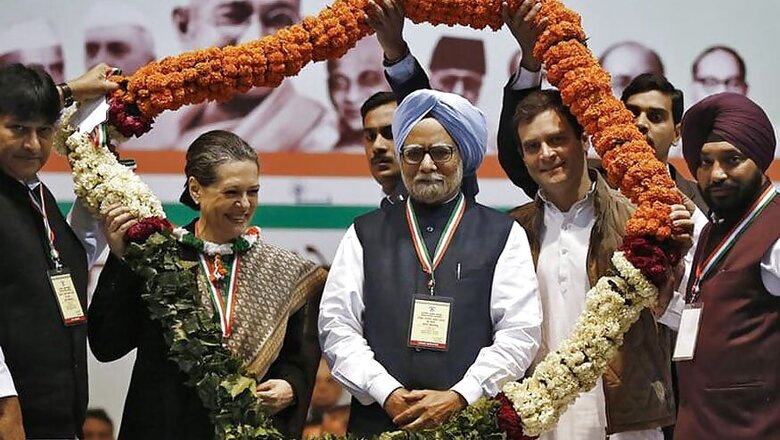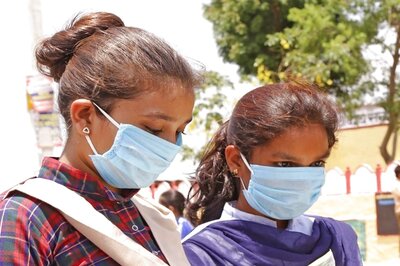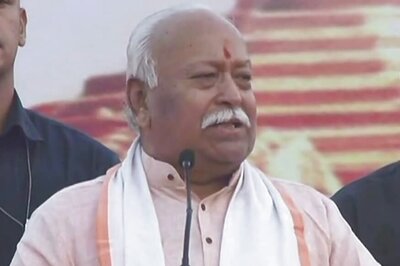
views
Elections in India over the last few years have followed a similar pattern. While the Bharatiya Janata Party (BJP) marches on, the Congress retreats. It is only a few regional parties which have managed to challenge the BJP but the Congress despite being present across the country has failed miserably to challenge BJP's spectacular rise.
"Geographically our state governments cover about 45% of India's population contradicted with the lowest ever point as far the Congress is concerned. It has lost state after state and has been reduced to 45 seats in the Lok Sabha. I am told that the population that Congress state governments cover is about 7-8% of India. So having taken a very obstructionist attitude in the last two years, the Congress now finds itself pushed to the margins in state after state. The big question is, whether the Congress is the new Third Front," Finance Minister Arun Jaitley quipped after the recent election results.
Even if one dismissed what Jaitley says as a winner's political rhetoric, there's no denying that the party that won India its Independence and has ruled longer than any other party, is in the ICU.
Is the Congress dying? Is there any hope of reviving it?
Over the last few days, there have been several obituaries of the Congress. Today Karnataka is the only major state where the party is in power and veteran Congress leaders agree that a drastic course correction is the need of the hour.
Digvijay Singh, the party's motormouth, has spoken of a major surgery. But surgery suggests that there is a need to go inside the body of the Congress and fix something.
But the 2016 Assembly elections prove that despite all the introspection and the AK Anthony Committee report that never became public, the diagnosis may be wrong.
"Satyavrat Chaturvedi has said cardiac surgery has to be done. It seems though, the Congress is a party which is very good at prescribing stuff for itself for example, there are a lot of reports on what can be done to correct the ideological course of the party and to effect organisational changes but none of these historically from the 1980s onwards have been taken on board," says political commentator Nistula Hebbar.
"In 2014 itself, there was an Antony committee report which nobody has seen and we keep waiting for this miraculous AICC reshuffle which is supposed to empower the party vice-president and elevate him to the president's position. It's been two years of Modi government. It seems like there's a great reluctance within the party to even think of what can be the solution," she says.
"If you look at the last Assembly, last week's Assembly elections, the Congress has gone up in all the states except Kerala, both in terms of seats and in terms of vote share. So it is not statistically correct that the Congress has gone down. If we look at the figures, it's the hype which the BJP has created as if you know, it has been a tremendous feat for them and they are all on the upswing. Results demonstrate that the Congress has gone up in terms of vote shares and seats, and the BJP has gone down in terms of vote share and seats," claims Nath.
It's true the numbers don't lie. Vote share figures suggest that the Congress has done better in West Bengal, Tamil Nadu and Assam compared to its performance in the Lok Sabha elections two years ago.
So yes, the BJP has lost out since the Modi wave of 2014. But in that election, people were voting for Narendra Modi for the post of Prime Minister. In 2016 they were voting for chief ministers. That's where the Congress has been found wanting.
Congress leaders argue that the party is too entrenched across the country to be written off completely.
Like Sachin Pilot who at 38 is one of the party's younger leaders. The former union minister moved to Jaipur to rebuild the party in Rajasthan after it was demolished in the last assembly and parliamentary elections.
"My experience has been that even though we've been in the opposition in Rajasthan, we are in a greater force for voicing people's concerns. I see people look up to the Congress whenever they feel they have been betrayed in some sense or the other but for us to be able to reach out and that's our job, I don't think any political party would expect people to come to them, the party has to reach out to them in more ways than one," says Pilot.
Even if the Congress is not doing that badly in terms of vote share and can tap into a support base on the ground, yet it is at the lowest ever point in its history.
"People thought Indira Gandhi was a problem in 1977. They thought Sanjay Gandhi was a problem in 1977 and there was a split," Digvijaya says on the 1977 elections.
But he maintains that for him the leader number one is Sonia Gandhi with the leader number two is Rahul Gandhi.
There are historical precedents but the recent string of defeats has left the Congress demoralised which is in stark contrast to the BJP, which has a dedicated cadre as well as RSS shakhas it can fall back on.
Moreover, Congress workers are used to working on the basis of patronage. But when the party is out of power, there is no patronage to hand out. It also means a shift in how the party operates.
But those roadblocks can be overcome. The real challenges are the crisis of leadership and who is really the boss: Rahul or Sonia Gandhi?
If it is Rahul, then is he the right man for the job?
The second challenge is more fundamental. Has the Congress become the party of entitlement? Is it no longer the big banyan tree that allowed opportunity and diversity? Is it just the party of dynasty?
Many Congress leaders say that one of the biggest problems they face is that they don't know who's the boss. Is it Sonia Gandhi, the party president? Or is it Rahul Gandhi, the vice president and heir apparent?
But the situation is not unique as the Congress has seen a similar arrangement earlier too.
But the equation today seems more complex, not just to party workers but also to state leaders. It has led to internecine warfare and the creation of multiple camps.
"There's a huge confusion in the Congress whether it's Sonia's Congress or Rahul's Congress. It's not just the junior leaders even the senior ones, even if they want to go and the states which are coming up for elections, they go to Sonia because many of them are very comfortable with Sonia. In fact what I was once told was by someone as senior as Anthony is that he goes to meet Sonia and she listens to them for an hour or so and then she says 'I think you should go to Rahul and speak to him'. So when they go to Rahul, he listens to them but not for an hour, he just listens to them for around 10 minutes and says I'll talk to my mother and then get back to you," says CNN News18 Deputy Chief of Bureau Pallavi Ghosh.
"Now, that's what the confusion is. They don't know whose Congress it is. I know it would have been easy if they were not very different in their working styles. Sonia's way of handling is completely different from Rahul's way of handling and that's where the confusion increases. Sonia is more kind of compromised and status quo, she'll listen to everyone actually trying to find a middle path. Rahul is like -- my way or the highway. So people don't know which extreme they've to go for and that I think is the biggest problem," adds Pallavi.
According to her there is a Sonia group and there is a Rahul group.
"Sonia's group is pretty the old guards, it's people like Ahmed Patel, Janardhan Dwivedi, Ambika Soni and the new is for Rahul. It is Amit Akshara, Kaushal Vidyarthee, there is Randeep Surjewala, Ajay Maken and they are completely different from each other. There is not much of an interaction. I mean, Anthony is of course, somebody who is common to both the groups but barring that there is no interaction between the people who are part of the Sonia group and are part of Rahul's group," she points out.
The two camps might well be a contributing factor. Many senior Congress leaders are vocal off-the-record but the vast majority is unwilling to face the camera.
"It has become too controversial," they say. Only journalists are willing to say publically what a section of Congress is saying in private: Sonia should hand over the baton to Rahul.
"If I was Congress president and I really wanted the vice-president to be the president, I would tell him, "Son, you please take over and make your own mistakes and learn your own lessons," because leadership is about taking charge -- the good, the bad and the ugly. It can't be worse than what has happened till now. It can only get better because as far as I see in 2017, there are plenty of states, which are going into polls where the Congress can if it pulls its act together. It is the only alternative to the BJP and therefore, it's not a bad time actually to take charge and to give charge to somebody who you want to see succeed," says Nistula.
Clearly the problem is not between Sonia and Rahul, but between Sonia's people and Rahul's people. As the two groups jostle for prominence, it is the Congress that loses out.
In 2004 the BJP painted itself as the party of aspirational India, trumpeting the India Shining slogan. The Congress, on the other hand, said that India was shining only for the rich.
It won that election and the one after that on the back of welfare schemes like the MNREGA and farm loan waivers.
But ever since Narendra Modi launched his election campaign in 2013, the BJP has created a new narrative that projects the Congress as a feudal party and its welfare schemes as largesse handed out by some lord to the poor.
However, Congress leaders call it unfair.
"See the Congress has been in the country for 130 years and we are a party that has always adapted and changed itself with societal changes from pre-Independence to post Independence to social equality movements to anti-poverty alleviation programmes, economic reforms, IT revolution. All these are the changes that the Congress has self-realised and made. No party can survive for so long unless it adapts itself and flexible enough to be able to connect with the larger masses," says Pilot.
"So the Congress has continuously been an organisation that has been able to mould itself to what is required and I think that process continues. We have always had a good mixture of people with a lot of experience and people who are full of fresh ideas, are imaginative and more importantly hard-working. That balance I think is very essential for the Congress party to move forward," he adds.
The comments are reasonable enough and certainly the next generation of Congress leaders are a dynamic lot -- modern and well educated. Many are mass leaders with constituencies of their own.
But there's a problem. Over three quarters of them, if not more, are dynasts and come from political families.
"Many stalwarts of Congress will lose and the BJP is here to stay for the next 20 years. Rahul Gandhi and Tarun Gogoi have humiliated me like anything. So this is, in one way, an individual accomplishment for me but people have not voted for this. People have voted to resolve the bigger identity crisis and the development of Assam," says Himanta Biswa Sarma, the former Congress leader who switched over to the BJP and won in the recent Assam elections.
At an intuitive level, there is something to the criticism. The Congress is dynastic at the very top and though Rahul spent several years trying to create a channel for a new generation of young leaders to rise from the ranks, the party's future still consists of dynasts.
So is the Congress increasingly out of touch with aspirational India? Sachin Pilot's father, Rajesh Pilot, was one of Rajiv Gandhi's hand-picked ministers.
So does Sachin think dynasty has a place in today's aspirational India?
"See I don't think being born to a family could be a disqualification but one has to really work hard and prove himself or herself. I am very proud about the family I belong to but I have worked amongst people, I have won elections, I have lost elections, I have worked in the government, I am working in the organisations and ultimately the judge are the people. If they vote for you, the collective wisdom of a few million people, I don't think can be brushed aside easily," he says.
He is right about the fact that dynast or not, the fate of every politician is decided by the voter. But the problem with the cult of dynasty is that it overshadows the Congress's traditional liberal values.
Politics is a game of ups and downs. I think the next story will be to recover from the downs. I mean there is no question that in the history of successful political parties, it's not so much that defeats and setbacks matter but the process of recovery from there and the BJP keeps pointing the fact that there were only two seats in 1984 and where they are now, says Congress leader Shashi Tharoor.
Former Chairman of the Unique Identification Authority of India Nandan Nilekani says there is a space for the party in India. "I think there's a huge opportunity in India for a Central Left liberal secular party which accommodates India's diversity. That needs to be re-emphasised again and again," he adds.
India needs a two party system. Democracy only works on the basis of choice and the Congress through the ages has been India's liberal party standing up for the values of diversity and liberty that this country was founded on.
In the months ahead India will get the answer as to whether the Congress can reclaim its traditional role? There is a good opportunity for the party to reinvent itself or lose itself in groupism and petty politics.



















Comments
0 comment